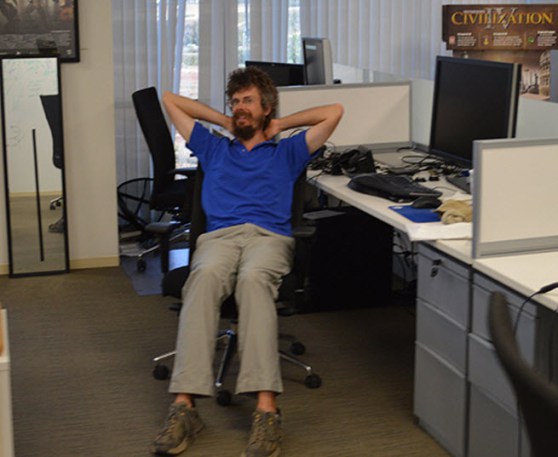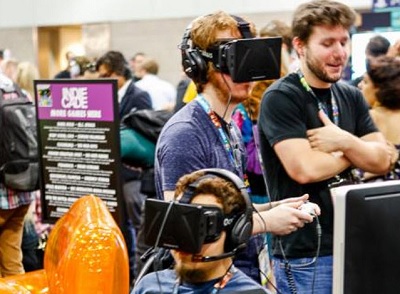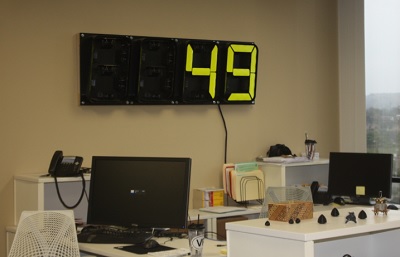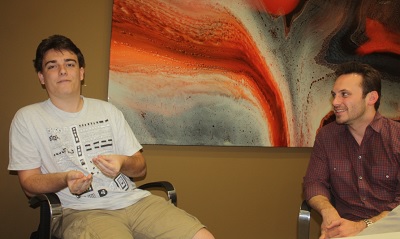Oculus VR was readying itself for a stellar E3, the biggest video game trade show in June. The maker of virtual reality game goggles was preparing a high-definition version of its Oculus Rift system. It had also closed a $16 million round of funding that would enable it to create a consumer version of its technology.
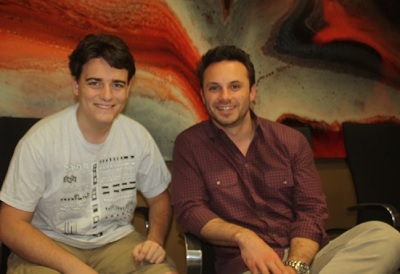 Then tragedy struck. Oculus VR co-founder Andrew Reisse was struck and killed by a car that was fleeing the police while he was in a cross walk. His death brought everything to a halt at the close-knit startup. The funding announcement was put on hold and work on the HD demo for E3 halted. The team gathered a memorial for Reisse and helped support his family. But the company rallied together and employees at Epic Games, the partner on the virtual reality project, flew out to finish the job that Reisse was leading.
Then tragedy struck. Oculus VR co-founder Andrew Reisse was struck and killed by a car that was fleeing the police while he was in a cross walk. His death brought everything to a halt at the close-knit startup. The funding announcement was put on hold and work on the HD demo for E3 halted. The team gathered a memorial for Reisse and helped support his family. But the company rallied together and employees at Epic Games, the partner on the virtual reality project, flew out to finish the job that Reisse was leading.
The HD version of Oculus Rift walked away with numerous tech awards, in some cases gaining more recognition than the new consoles from Sony and Microsoft. The team still missed their colleague. But they were able to carry on his work and are now positioned better than ever to bring virtual reality gaming to the masses.
We talked with Oculus VR chief executive Brendan Iribe and co-founder Palmer Luckey at their headquarters in Irvine, Calif. Here is an edited transcript of part two of our conversation. (See here for part one).
GamesBeat: As you were preparing for your big moment at E3, you lost your co-founder, Andrew. I know that shook everything up. How did you guys get through that?
Iribe: Well, it was certainly a shock and pretty painful. Some of us, myself and Mike [Antonov] included, had worked with Andrew for 15 years. Pretty much ever since I began working in gaming, it’s been with Andrew. A number of guys here have worked with him for a long time. To have him pass away was a painful moment for the team. There are people here who, even if it was only for six months, still got to know him really well. It’s a startup. We’re here every day. We’re here most weekends. Andrew was part of that core team, being in here all the time. You get very close very quickly. I joked with my girlfriend that I spent more time with Andrew than I had any significant other in my life.
You get to know somebody well and you really enjoy that person. When they’re suddenly gone, it’s hard, but we huddled together as a team and supported the team, supported his parents. His parents came out here for two weeks. They spent a lot of time at the office and got to know a number of us, people they hadn’t really spent much time with in the past. You’re so busy working that you don’t get to know everybody’s family. But they really got to know more of the team here.
It was tough. It came right at that time I mentioned before, around E3. It put a lot of things in limbo. We were set to announce funding. He was in charge of Unreal Engine 4 integration, which was our showcase demo at E3. It wasn’t done yet, and immediately that was in jeopardy. We had to pause and think, “How do we move forward from here?” We were fortunate that Epic knew the priority and the pressure to get E3 ready. They were excited about it because Epic wasn’t showing anything new at E3. This was going to be the thing we did together.
When we told them, within a few hours they said, “We’ve spoken internally. We’re incredibly sorry for your loss, but we want to help honor Andrew and get it done.” They were willing to step up and do a lot of the work. They put a whole team of guys on it for about two weeks to get it ready. It came in right at the last second. That support from Epic helped the team here because we did see it get done. It wasn’t like, “Are we backing out of E3? Do we have anything to show?” It was, “Let’s get there. Let’s honor him.” They even put a plaque in the demo, which was their idea. It was awesome.
Luckey: The VR Cinema guy put a reserved seat in the game for Andrew.
Iribe: Yeah. The VR Cinema demo had a little Andrew memorial. That helped pull the team together. Since then, time heals. We all miss Andrew. He sat right in front of my office, so I would see him every day. Not seeing him there still has its effect. But the team pulled together, and we’re making good progress.
GamesBeat: You had your funding coming in at the same time?
Iribe: We did. It was right around the same few days that we were going to be internally celebrating the deal being closed and preparing the announcement. Then we suddenly got news of Andrew. That just paused everything. We’re very thankful for the investors. They understood. You hope they do, but you never know. In this case, they completely understood. We told them, “This just happened.” They said, “We’re here to support you. Let us know what we can do. Let’s wait on the announcement and do it when it’s appropriate and focus on team and family.” So we made the decision to push that until after E3.
GamesBeat: You announced it in mid-June. It seems that this is one of the things that could elevate the company into a much bigger competitor — a more realistic enterprise. It’s not a science project anymore.
Iribe: We have the capital to make it something very real now. With or without further revenue, we can get to the consumer market. The good news is, we actually are continuing to sell so many dev kits that we’re not spending that Series A yet. Now, we have some plans on what we can do with it, mainly around hiring. If you look at our career posting page, we have I think 30 or more positions there now — engineering or developer relations or support. That’s the big focus. Let’s build up an incredibly smart team. We’re trying to hire the best people we can find. I’ve never worked in a company where we’ve had 20 developers, and five of them had PhDs. Not to say the everybody needs PhDs, but it’s a really smart group of folks.
Luckey: There are people who would love to work here, but it’s harder for them to make the jump. Like you said, it makes it so this is not a science project. There are people who can jump from where they are now, if they’re going to a real company that’s going to be around for a while. This is as opposed to, “Hey, want to leave your stable job and come to this thing that might not be around in six months?”
Iribe: A hardware startup with no funding is a risky venture. A hardware startup with a lot of funding and a lot of momentum has a lot less risk. We’ve been able to attract people we couldn’t have otherwise.
GamesBeat: You seem to have gotten the attention of a lot of big companies as well. Folks like Intel and Nvidia care about this now, because they see it pushing computing forward.
Luckey: Some people answer e-mails now. [laughs]
Iribe: Now there are people who send us e-mails offering support. It’s up to us to answer the e-mail now. It’s really helped. VR is a lot bigger than Oculus. There’s a lot more involved in the whole experience than just our tech. There’s the PC, the video card, the CPU, all the different components. We benefit, and the whole experience gets a lot better, if the hardware guys are eager to make it better.
Luckey: They’re eager to make VR work because VR is a huge driver for graphics improvements. People have been saying for a long time that we’re reaching some plateau as far as what we can get graphically. VR is something that needs to always run at 60 frames per second or better. Really you want 100, 200 frames per second. You need high resolution. You need 3D, so you’re already rendering two scenes instead of one. It’s something that brings the requirements up again.
Iribe: You start to notice textures and things. When you look closer at something, you expect to get higher detail. Now, you need high-detail textures. You can walk up close to a wall and have it be blurry in VR. It looks very wrong.
GamesBeat: You also have to sell this at a consumer price. You have to have Moore’s Law helping you out for that.
Iribe: Even on the headset itself, the components there — For a number of screen manufacturers, they’re reaching the point of not being able to visually tell the difference in resolution on a cell phone between today’s 1080p and a 4K screen. Could you really tell the difference? Probably not on a mobile phone with your naked eye. Now, on a VR headset, you can tell a big difference. For a number of companies and engineers, this just opens up a new path of innovation. It’s very exciting. It gives people a reason to make better GPUs, CPUs, screens, all kinds of parts.
I think people will be really happy with the first consumer experience that they get. In fact, in the discussion we’ve had with Valve and a number of the people involved — Personally, I don’t know how Palmer feels, but I’m impressed at what the consumer version is going to be. It’s better than what I thought it would be. A lot of problems have been solved that we didn’t know we would solve in this first consumer experience.
Luckey: When you said, “So is that what we’re going to be consumerizing?” the reason I said, “Not really” is because what we’re making into a consumer product is actually far better than that. Far better than the HD prototype. What people have seen is nothing compared to what’s coming.
GamesBeat: It must feel good that even in a year where new consoles were announced, you guys came away from the show one-upping them.
Luckey: Just a little bit.
Iribe: We won Best Hardware, yeah, at their show. It was exciting. That just shows that there’s a demand for something new. I think the consoles are great. But they’re a faster version of what’s there today. There’s not something too fundamentally different about them. How excited can you get about a controller adding a “Share” button? It’s neat, and I’m sure it will open up new doors, but it leaves a little more to be desired.
Luckey: The other thing is, I think a lot of people are excited about VR because you can see it continuously evolving. You can see something today and know it’s going to be better next year. You can guess, based on our strategy of being on PC, that it’s going to keep getting better. When a console’s announced, what you get is what you get. It’s not going to change all that much over seven or eight years. They might add new stuff. Kinect was added late in the Xbox 360 lifecycle. But what they announce, people know it’s going to be that way for a long time.
Iribe: There are a lot of advantages to that because then you can develop to a dedicated piece of hardware and you can make a big investment in it.
GamesBeat: But you want to be part of something that improves.
Iribe: Yeah. That’s what’s excited a lot of people about mobile. Mobile has improved very fast and innovated very quickly.
Luckey: It’s moving way faster than PCs.
Iribe: I think you’ll see more innovation in VR than any of the other spaces, especially over the next five or 10 years. It’s going to move quickly. What’s the VR going to look like seven or eight years from now toward the end of the console cycle? It’s going to be pretty incredible.
Luckey: You know what Abrash said at his GDC talk? You’ll have to look for the quote, but it was something like, “Personally, I think the next 15 years of gaming are going to be more exciting than my entire past career.”
Iribe: I think what he was pushing there is that there will be more innovation, especially around VR gaming, than there has been in the past around 3D gaming. There are more problems to solve. His talk was called, “Why VR Is Really Hard.” So he did say that, along with this exciting path ahead, it is going to be much harder than the last 15 years have been. This isn’t just rendering more triangles. A lot of human factors need to be solved.
GamesBeat: Once you get this out on the PC, then you have to do it in Google Glass, right?
Iribe: Or mobile. We’ll see how it all goes. It’s PC first, but we’re very excited about the mobile side of things as well.
Luckey: We’re not going to stay static for seven or eight years. We’re going to continuously try to make a better product.
Iribe: I think people have an appetite for VR at $200, $300, $400. It’s something so new and improves so quickly, people do have an appetite to buy that. If people are getting a new VR headset every two or three years that’s incredibly improved, you want to go do that. You want to see this new thing.
Luckey: Especially for PC gamers, who are used to dumping far more money into displays. I’ve spent more money on a keyboard than on the Rift. [laughs] I’ve spent several times more on most of my graphics cards. If you’re passionate about PC games and that’s where you’re putting your money, the Rift is a bargain.
GamesBeat: Have you heard about any competitors jumping in?
Luckey: It depends. Are they a competitor, or can they compete? [laughs]
Iribe: Not yet. But it’s inevitable. We imagine that some people will jump into the AR and VR space that are complementary. We look at Google Glass. It’s very complementary. It’s not competitive. It’s a different experience. It’s used for different purposes.
Luckey: Nobody is going to say, “I was going to buy a Rift, but instead I’m going to buy Glass.”
Iribe: Competition is inevitable, and at the end of the day, it will help us make a better product.
VentureBeat's mission is to be a digital town square for technical decision-makers to gain knowledge about transformative enterprise technology and transact. Learn More
